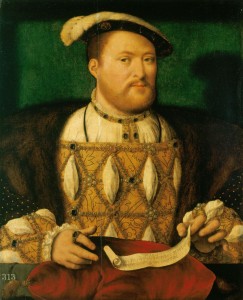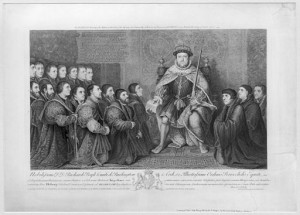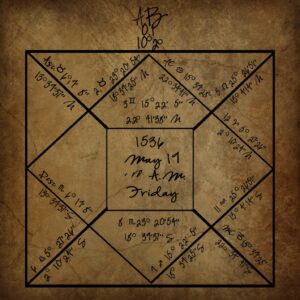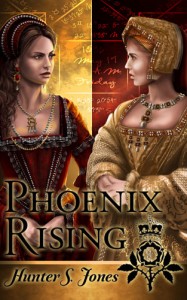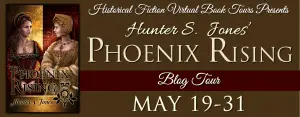
As part of the blog/book tour for her latest novel Phoenix Rising: A Novel of Anne Boleyn, Hunter is here again on The Anne Boleyn Files to share a guest article with us – welcome Hunter! MadeGlobal Publishing is also offering one lucky Anne Boleyn Files follower the chance to win a copy of Hunter’s new novel, see bottom of post for more information. Over to Hunter…
When we think of Tudor England, various images flash through our mind. Kings, many queens, dashing courtiers, spies, and ruthless intrigues enter the mix. Add a dash of Renaissance fashion and religious upheaval and you have a heady, or often headless, concoction of brutality and inspiration. All at the same time. Tudor England was the springboard into The Empire and the seed of the modern world.
We look at the savagery and dogged pursuit of the throne by the ‘long shot’ king, Henry VII. His surviving son, Henry VIII changed the face of Europe for ever when he founded the Church of England. His daughter, another ‘long shot’ set the standard for today’s world through industry, exploration and education.
That’s where we find Henry VIII – between two worlds, with one foot in Medieval England, its customs and superstitions, and the other in the Elizabethan Age of Gloriana. We often forget that about Henry, due to his fixation on siring a male heir. But, there he is. We know of his love of women. That’s why we are all followers of The Anne Boleyn Files. Yet, we know his flaws. Which attracts us more? It is the duality of Henry and the Henrician Court that has held the public’s attention for five hundred years.
Henry VIII had a foot in the bloodiest family feud in the history of the world, now known to us as the War of the Roses. When Henry VII overcame the forces of Richard III, England began the most peaceful era it had known for over one hundred years. His father’s frugality lead to a more prosperous kingdom, too.
Henry’s other foot was the legacy of his daughter with Anne Boleyn, Elizabeth I. His daughter, not his son, became one of the most powerful and beloved rulers of England. Gloriana. Good Queen Bess. Her reign opened England to a level of wealth and power the country had never known. Eventually, it led to the Stuarts and evolved into the United Kingdom. No matter how we view the Tudor Dynasty, their reigns—although brutal and barbaric—eventually gave England a place on the world’s stage that the country had never known. More about that at a later date.
Let’s get back to Henry VIII. We all know about the political and religious upheavals, all the wives, etc., and etc. Today, I want to focus on the bridge between old and new which was experienced during his reign. especially when it came to the medical arts. Let’s look at the effect Henry’s health had on the country he ruled.
Henry VIII had a keen interest medicine. He founded the Royal College of Physicians in 1518. He combined The Barbers Company of London and the Guild of Surgeons to form the Company of Barber-Surgeons in 1540. His administration passed seven Acts of Parliament to regulate and license various medical practitioners. Aided by Sir Thomas More, Henry oversaw changes in the water supplies and sewers. Henry literally attempted to clean up London.
But, what about this? As I understand it, this law is still in effect in the United Kingdom.
Summary of The Herbalist Charter of King Henry VIII:
It is well known that the Surgeons who are organized under their own trade guild and recognized by law, have done nothing but tend to their own lavish financial enrichment, have done nothing to ease the distressed patient, but have spent an enormous amount of time suing and harassing honest persons who have the knowledge of nature and how to use this knowledge, however obtained, and generously minister to the sick.
It is also well known that Surgeons will not provide services to the sick unless they receive great sums of money and even then, often cause harm to their patients.
For this reason, from this time and forevermore it shall be lawful for every person who lives in any part of the Realm of England or any of its dominions, and who has knowledge and experience of the healing nature of herbs, roots and waters, or the operation of same, to be free to treat the sick without “suit, vexation, trouble, penalty or loss of their goods.”
Hence, we see that Henry VIII had a keen interest in better living through chemistry, or at least pharmaceuticals. Henry kept an apothecary cabinet in his own chambers. He personally prepared medicines in the form of salves and ointments from ingredients such as ground pearls and white lead for the treatment of his ailments, ‘An Oyntment devised by the kinges Majesty made at Westminster. And devised at Grenwich to take away inflammations and to cease payne and heale ulcers called gray plaster.’ He even prepared remedies for his friends. These recipes can be found today in the British Library.
The English and Welsh belief of the Medieval Mystical Tradition, especially by females, is well known through literature. Think of the tales of Avalon and you get the picture. There was a thin veil between Magic and medicine during the reign of Henry VIII. What we see as magic seemed perfectly logical and even scientific to that era. Magic often contained ideas which were accepted practices by all levels of society. Knights told of balms, called “weapon salves” which would protect them and even heal them if they were applied before a battle.
To heal a toothache, the wise woman would write ‘Jesus Christ for mercy’s sake, take away this toothache’ three times before saying the words aloud and then burning the paper. Another cure for a fever was for the healer to write ‘Arataly, Rataly, Ataly, Taly, aly, Ly’ on paper, and wrap the paper around the patients arm for nine days. Each day the patient was to say three paternosters to St. Peter and St. Paul. At the end of the ninth day, they were to remove the paper and burn it.
Then as now, the belief in the cure often aids the patient in healing. They called it Magic or medicine; now we call it science.
Likewise, astrology was not a form of entertainment. It was a highly respected medical theory taught at the universities. The stars, planets and the moon effected everything, especially as they orbited around the earth, or so they believed during this period of time. It could be seen by watching the tides, the mating seasons of animals and the growth of plants seeded at certain planetary cycles.
When a patient visited a physician, the visit would begin by asking for your date of birth. From there, your horoscope would be cast via a star map. Then a horoscope would be cast for the exact moment your ailment began, so that the physician could cast the horoscope of the illness and relate it to that of the patient. In prescribing medications, the healer would ask which parts of the body were affected because each area of the body comes under the influence of different planets. You would be treated according to which planet ruled the medicine best suited to your ailment. Those who grew plants for medicine would plant seeds at the new moon and harvest at the full moon to get the greatest benefits from them.
According to Susan Bordo, the best-selling author of The Creation of Anne Boleyn, “Astrology was not a con, nor was it incompatible with religion in the 16th century. Indeed, it was considered to be a way to understand God’s divine plan, and was viewed to be as grounded in science as that of the study of the changing seasons.”
From all this, you can see how Henry VIII, as the bridge between the medieval world and the world of the Elizabethan era, would turn to his female Welsh physician at the most crucial point of his reign, the execution of Anne Boleyn. From all this, Phoenix Rising, my fictional account of the last hour of Anne Boleyn, was born.
Available for purchase now on Amazon.com – getBook.at/phoenix_rising
This article is just one stop on Hunter’s blog/book tour, here is the schedule so you can enjoy every stop:
- Tuesday, May 19 – Review at 100 Pages a Day
- Wednesday, May 20 – Here! And Spotlight at The Never-Ending Book
- Thursday, May 21 – Review at Book Drunkard
- Friday, May 22 – Spotlight at A Literary Vacation, Spotlight at What Is That Book About
- Saturday, May 23 – Spotlight at Curling up by the Fire
- Monday, May 25 – Review at JulzReads, Spotlight at Just One More Chapter
- Tuesday, May 26 – Review at Book Lovers Paradise, Spotlight at CelticLady’s Reviews
- Wednesday, May 27 – Review at Book Nerd, Guest Post at The Readers Hollow
- Thursday, May 28 – Review at Bookramblings
- Friday, May 29 – Review at The Reading Queen
- Saturday, May 30 – Review at Historical Fiction Obsession, Spotlight at Beth’s Book Nook Blog
- Sunday, May 31 – Review at Genre Queen, Spotlight at Unshelfish
Giveaway
To be in with a chance of winning a paperback copy of Hunter’s Phoenix Rising: A Novel of Anne Boleyn, simply leave a comment below saying why you’d like to win this book. The closing date for comments is midnight Tuesday 26th May and one lucky winner will be picked at random shortly after and contacted via email. Only one comment per person please. This giveaway is open internationally.
About the Author
Deb Hunter publishes as Hunter S. Jones. Her best-selling novel, “September Ends” won awards for Best Independently Published Novel and Best Romance, based on its unique blending of poetry and prose. Her story “The Fortune Series” received best-selling status on Amazon in the Cultural Heritage and Historical Fiction categories. She has been published by H3O Eco mag, LuxeCrush, Chattanooga Times-Free Press, and is now a freelance contributor for the Atlanta Journal Constitution. She has recently been accepted into the prestigious Rivendell Writers Colony. Her arts, music and culture blogs on ExpatsPost.com are filled with eclectic stories regarding music, writing, the arts and climate awareness. She lives in Atlanta, Georgia with her Scottish born husband. Her undergrad degree is in History with an emphasis on the English Renaissance and Reformation.
For more information please visit Hunter S. Jones’ website at http://www.huntersjones.com/. You can also follow her on Facebook, Twitter, and Pinterest.
Sources
- “500 Years Later” by CR Chalmers and EJ Chaloner, Journal of the Royal Society of Medicine.
- “King Henry VIII’s Medical World” by Dr. Elizabeth T Hurren, Senior Lecturer History of Medicine at Oxford Brookes University.
- “The Medieval Mystical Tradition in England” by E.A. Jones, Exeter Symposium VIII.
- “Anne and Elizabeth: Consulting the Stars for Elizabeth’s Birth” by Susan Bordo – https://thecreationofanneboleyn.wordpress.com
- www.BritishLibrary.com
